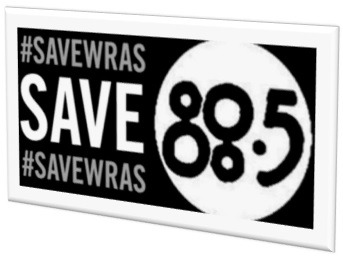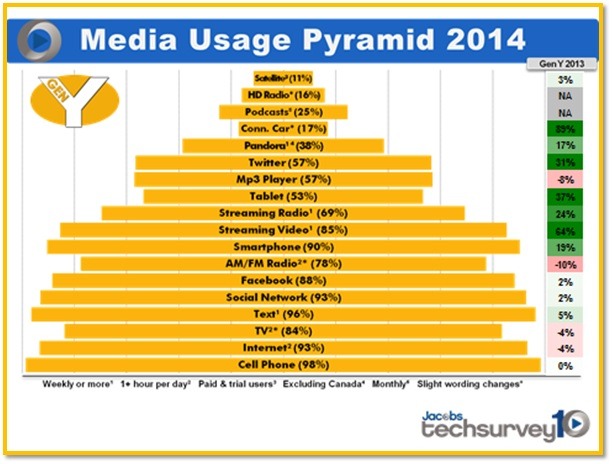Last week, Lori Lewis and I were honored to speak at the North Carolina Broadcasters Association conference in Raleigh. It’s another strong state broadcaster group, headed up by WRAL-TV’s Steve Hammel, former president Dick Harlow, and the incoming Gary McNair. We were treated with incredible hospitality throughout the event.
Matt Thornhill of The Boomer Project keynoted the conference with an entertaining speech about understanding the changing generations of America. Matt spent considerable time talking about Millennials – a hot topic these days.
Problem is, when you generalize generations, you often miss some important characteristics along the way. The media especially love to categorize and typify these groups. And Millennials are as easy to stereotype as their older brothers (Gen Xers) and their parents (Boomers) were over these past few decades.
A major belief about Generation Y – or Millennials – is that they don’t listen to the radio largely because they’re totally ensconced in new media.
Yet, a look at our Gen Y pyramid from this year’s Techsurvey10 reveals that while they are very active in all things media, radio still constitutes a key source of entertainment and information. Now you can make the case that our study is primarily populated by broadcast station email database members, and you’d be right. But as we continue to learn every year, many are as critical of FM radio as those who no longer listen. The bottom line is that the majority of them still listen to broadcast radio, and they’re opinionated about it.
A case in point is what’s happening right now at Georgia State University. If you haven’t caught up with this story, it’s a good one. Alums of WRAS – or Album 88 – have banded together, organized a petition drive, and a student protest to save the station from being turned over to Georgia Public Broadcasting.
The term “student protest” has essentially become an oxymoron these past few decades, and yet, these crazed, radical Millennials in Georgia are up in arms about what’s happening to their historic student-run FM radio station. In fact, they’re going to the wall for it.
And to broaden out this story about these Gen Yers, last week, in a show of support, more than 40 other independent college stations simulcast Album 88 to bring national attention to the loss of this student-run radio station in the Atlanta area. So it’s not just about this isolated situation in Georgia.
Now it’s interesting that unlike us Boomers who were protesting against a war or for civil rights, this supposedly alienated generation is up in arms about an FM radio station. You could dream up all kinds of things for them to protest against – onerous student loans, a terrible job market, GLBT issues, the treatment of veterans, climate change, immigration – there’s no shortage of big time causes and problems.
 And yet, here they are, creatively organizing to save Album 88.
And yet, here they are, creatively organizing to save Album 88.
If this were 1969, it would make sense. Back then, where else could you hear indie music, obscure stuff, and new music if not on a progressive FM station?
But it’s 2014, and Georgia State University students and alums have no shortage of music options, from Pandora and Spotify to YouTube and 8tracks. From Apple and Google to Amazon and iHeartRadio, there’s never been a more abundant time for customized music consumption for very little effort.
But they realize there’s something important at stake here. They want their local, independent FM radio station. And they’re willing to go to bat for it.
And a stunned university is backpedaling, compromising, and talking. And they’re heading for a compromise that will retain several hours weekly of Album 88 programming on WRAS.
This is a better story about the value of radio than the spread of NASH or talk radio influencing Tea Party races. It speaks to the passion that young people have for their favorite radio station.
This is about Millennials. They want their FM radio.
It’s a story that broadcasters should be telling.
- What To Do If Your Radio Station Goes Through A Midlife Crisis - April 25, 2025
- A 2020 Lesson?It Could All Be Gone In A Flash - April 24, 2025
- How AI Can Give Radio Personalities More…PERSONALITY - April 23, 2025





Thanks for addressing the issue. Ironically, some of the most devoted #SaveWRAS volunteers are GSU FILM students, who would be the ones to directly benefit from this “partnership”, and have never been on WRAS staff.
GSU Administration neglected to realize that WRAS Alums have careers in media. We have banded together from Jocks from the early 70’s to current djs.
Not only have the students had their voice taken away, but local artists and venues miss the opportunity to connect with listeners. GSU campus organizations and very small not for profits lose the opportunity to share their messages – many cannot afford grant-writing to get additional exposure, the impact of the loss of these PSAs is devastating to them.
There is a trend where NPR is “eating up” college stations. NPR is silent while two of their affiliates are battling out in the Atlanta market, with Album 88 the loser. The 2 NPR stattions stations are simulcasting the vast majority of their programming. One has to ask how this benefits the community, when so many others – students, musicians, venues, listeners, campus organizations, other not for profits, and WABE (the other NPR station) lose
The need for independent student-run radio stations is obvious, and I have a feeling of pride that your group is taking the lead here. That other college stations are supporting this effort is also heartening. Like every radio station in America right now – commercial, public, or even NPR – its value to consumers in a changing world has never been more apparent. Congratulations on what you’re doing for your community, your university, and for yourselves.
As a WRAS alum who has absolutely zero to do with broadcasting today, the Album 88 experience was still profound to me professionally. I took away more from my time at WRAS than I did at Georgia State University.
It has not been easy to keep the issue in the media, much appreciation to folks like you who continue to support the situation. If it can happen so easily to the country’s largest student-run radio station, NO college station is safe.
Supporters of college radio can learn about the Album 88 Alumni’s counter proposal at savewras.com/proposal. We need emails written to the Admins of GSU and GPB. Additionally, we are asking people to boycott supporters of GPB at boycottgpb.com GPB can ignore our calls, emails, requests for meetings, but they cannot ignore the impact to their bottom line.
Thanks for the background on the WRAS/Album 88 situation. Again, it is heartening to see young people can motivated to take action – especially on an issue like this.
BTW, I would love for everyone to use their names, and will require that for future comments on this “In Protest” post, OK?
WRAS is apparently different, interesting and compelling, so it inspires passion among people who typically aren’t so passionate about radio. I think that’s the real lesson here. Why doesn’t some commercial broadcaster try replicating their programming and put it up on a translator in a big college town?
I’ll bet the #1 station in a lot of markets wouldn’t generate as much interest if they were sold and changed format. Surely there’s a midpoint between PPM optimization and listener engagement that would result in ratings and passion that could be leveraged to marketers better than some of today’s wallpaper PPM friendly formats.
The uniqueness of the programming is clearly part of the driver here, Bob. And you’re correct that many commercial stations couldn’t muster up this kind of outcry. But I also get the sense that students and alumni alike share a great sense of potential loss with an institution like WRAS. That they are willing to go out on the limb to protest the demise of their station was what truly resonated with me.
Xers and Boomers who criticize and stereotype Millennials do so at their own risk. There hasn’t been another group since Boomers that has been more wrongly stereotyped than Gen Y. I actually saw a feature on the CNBC website yesterday that offered up the key reason why Millennials are having trouble finding jobs: body odor. If it wasn’t so comical, it would be offensive. https://www.cnbc.com/id/101796300
Thanks for taking the time to comment, Bob.